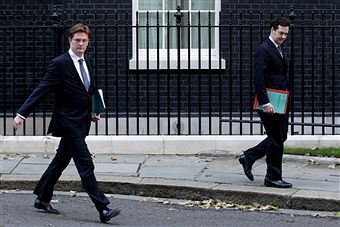 As expected, the Chancellor announced reductions in public spending – though not
quite as severe as indicated in the Emergency Budget last June. Government expenditure will fall by 3.3 percent over four years rather than 3.6 percent as expected, leading George Osborne to
state – correctly – that departmental budgets will be higher than those pencilled in by Labour – an outcome many may not regard as desirable. In fact, Osborne will be
spending 2 percent more in 2014/15 than Gordon Brown was in 2008/9. Departmental spending will fall 10 percent rather than 13 percent – largely paid for by more optimistic assumptions about savings
on welfare and debt interest payments. Capital spend was hit the hardest – being cut by 28 percent. Overall, public finances are still on track to eliminate the structural deficit (less
capital spend) by 2015/16.
As expected, the Chancellor announced reductions in public spending – though not
quite as severe as indicated in the Emergency Budget last June. Government expenditure will fall by 3.3 percent over four years rather than 3.6 percent as expected, leading George Osborne to
state – correctly – that departmental budgets will be higher than those pencilled in by Labour – an outcome many may not regard as desirable. In fact, Osborne will be
spending 2 percent more in 2014/15 than Gordon Brown was in 2008/9. Departmental spending will fall 10 percent rather than 13 percent – largely paid for by more optimistic assumptions about savings
on welfare and debt interest payments. Capital spend was hit the hardest – being cut by 28 percent. Overall, public finances are still on track to eliminate the structural deficit (less
capital spend) by 2015/16.
This is an unprecedented change in the direction of public spending. It will feel painful – partly because governments very rarely cut public spending in real terms (using economic
growth, borrowing and tax rises to generate increases), and partly because of the decision to protect some departments far more than others. A large chunk of this is due to what Policy
Exchange believes are unwise ringfences for the NHS and overseas aid. Relatively generous settlements in some areas (increases of 0.3 percent for the NHS, 16 percent for Energy and Climate
Change and 31 percent for overseas aid) mean very tough measures for others (cuts of 25 percent for the Home Office, 28 percent for Business, Innovation and Skills – and HM Treasury itself a
remarkable 55 percent). We believe that most of these reductions can be achieved with plausible or desirable measures – cutting poorly-targeted or ineffective programmes, bureaucracy
and merging or scrapping wasteful organisations.
The reality may turn out rosier than today’s announcements suggest – if welfare savings or economic growth are stronger than anticipated, which is of course possible, the Chancellor
still has significant headroom to increase public spending in subsequent budgets. Several reforms Policy Exchange has advocated have been adopted (the abolition of Train to Gain, the
refocusing of Sure Start and a £1.7bn increase in public sector pension contributions, for example) while other relatively inefficient programmes will carry on (such as winter fuel
payments). However, for some departments, relatively meagre increases during the Labour years will be more than reversed – less will be spent on defence in 2015 than 22 years
previously. Stories (and perhaps the reality) of planeless aircraft carriers, threatened prison closures and mass public sector strikes could well plague this government through much of this
parliament.
Ed Holmes is a Research Fellow in the Economics Unit at Policy Exchange and works on public spending, taxation policy and fiscal consolidation.
Ed Holmes
Osborne blunts the axe – slightly






Comments